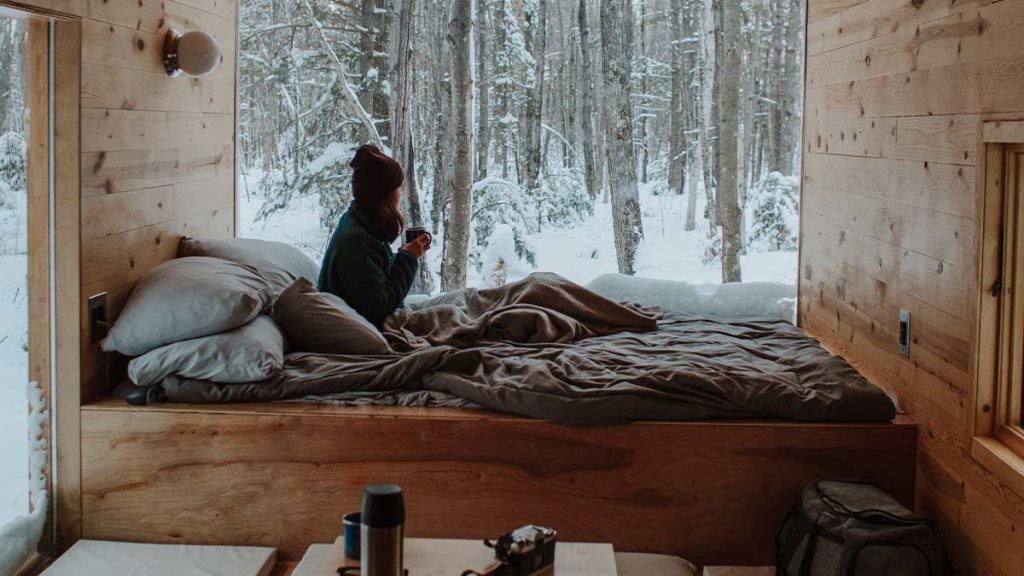If you’ve ever dreamt of escaping the hustle and bustle of city life, starting your own cabin rental business might be your ticket to turning that dream into a thriving venture. Cabin rentals offer a cosy retreat for nature enthusiasts, providing a lucrative opportunity in the vacation rental industry. Whether you’re drawn to the tranquillity of nature or the allure of providing a cosy retreat, this step-by-step guide will walk you through the essential steps to kickstart your own cabin rental business. Get ready to turn your dream into a cosy reality
How to Start a Cabin Rental Business
Launching into the world of cabin rentals requires a blend of research, preparation, and a well-thought-out business plan. Before the first guest checks in, it’s crucial to navigate the landscape of costs, investments, and marketing strategies. This guide is here to walk you through the essential steps to ensure your cabin rental business starts on the right foot. Whether you’re a budding entrepreneur or seasoned in the industry, let’s explore the following steps that will pave your way to a thriving cabin rental business and will teach you how to run a cabin rental business:
1. Laying the Foundation of Your Cabin Rental Business
Before embarking on this venture, it’s crucial to conduct thorough market research to understand the dynamics of the cabin rental industry in your chosen location. Assess the demand for cabin rentals in the area, identify any gaps in the market, and analyse the competitive landscape.
Defining your target audience is essential for tailoring your offerings and marketing strategies. Consider factors like demographics, travel preferences, and desired amenities to create a clear picture of your ideal guests.

2. Deciding over Your Cabin Location: A Critical Decision
The first step in launching your cabin rental venture is deciding on the perfect location. Consider scenic spots like mountains, woods, lakesides, or even residential areas. Your investment approach matters too:
- Bare Land: Are you starting from scratch with an empty plot for construction?
- Renovation Project: Opting for an old cabin that needs a revamp?
- Turnkey Cabin: Going for a move-in-ready option?
3. Conducting Market Research for Smart Investments
Explore vacation rentals in your target area on platforms like Airbnb or Booking.com. Utilise analytical tools like AirDNA to understand vacation rental data specific to the location. Consider factors such as proximity to natural attractions, outdoor activities, and seasonal trends. Choose a location that aligns with your target audience’s preferences and offers a unique experience.
Whether your cabin is nestled in seclusion or miles away from the nearest town, a robust online marketing strategy, including social media promotion, can ensure your cabin gets the attention it deserves for bookings.
4. Choosing the Right Cabin for Your Rental Business
The heart of any successful cabin rental business lies in the property itself. Carefully evaluate potential properties, considering factors such as location, condition, amenities, and unique selling points. When diving into the cabin rental business, selecting the right type of cabin is a crucial decision. Here are various types to consider, each offering unique features and appeal:
Log Cabins
- Characteristics: Traditional, rustic charm with wooden logs.
- Appeal: Ideal for a cosy, classic retreat experience.
Mountain Cabins
- Location: Situated in mountainous regions.
- Appeal: Perfect for adventure seekers, offering breathtaking views.

Lakeside Cabins
- Location: Nestled by lakeshores.
- Appeal: Serene and tranquil ambiance, water activities.
Woodland Cabins
- Setting: Amidst lush forests.
- Appeal: Immersed in nature, perfect for wildlife enthusiasts.
Modern Cabins
- Design: Sleek, contemporary architecture.
- Appeal: Attracts guests looking for a blend of comfort and style.
Rustic Cabins
- Aesthetic: Weathered, natural appearance.
- Appeal: Draws those seeking a back-to-basics experience.
Secluded Cabins
- Location: Isolated, away from urban areas.
- Appeal: Offers privacy and a peaceful escape.
5. Crafting a Strategic Business Plan for Your Cabin Rental Venture
Develop a comprehensive cabin rental business plan that outlines your goals, target market, marketing strategy, financial projections, and operational plan. Having a well-thought-out business plan before purchasing your cabin is strongly recommended. This strategic document enables you to thoroughly assess the viability of the investment and the overall feasibility of your business venture. It serves as a valuable tool for informed decision-making, helping you navigate potential challenges and maximise the success of your cabin rental endeavour.
6. Navigating Legal and Regulatory Compliance
Abiding by local regulations and obtaining necessary permits is crucial for operating a legitimate cabin rental business. Familiarise yourself with nuanced aspects, including zoning regulations, tax obligations, mandatory insurance coverage, and safety standards specific to short-term rentals in your jurisdiction. This comprehensive understanding not only ensures legal compliance but also paves the way for a smooth and legitimate operation of your cabin rental business.
7. Calculating Your Cabin Rental Business Investment
Calculating the investment for starting a cabin rental business involves considering various factors. Here’s a simplified breakdown:

Property Purchase or Construction Costs
- For land purchase, evaluate the cost of desired locations.
- If constructing, consider architectural design, construction permits, and local building regulations.
- Include fees associated with legal processes like land surveys and title deeds.
Renovation and Furnishing
- If renovating an existing cabin, assess costs for repairs, upgrades, and aesthetic enhancements.
- Allocate budget for quality furnishings, decor, and amenities that align with your target audience.
Operational Expenses
- Account for monthly utility costs such as electricity, water, and gas.
- Plan for ongoing maintenance and repairs to keep the property in top condition.
- Invest in property management tools and software to streamline operations.
Legal and Insurance
- Set aside funds for legal consultations to ensure compliance with local regulations.
- Consider the costs of property insurance for protection against unforeseen events.
- Include liability coverage to safeguard against potential guest-related incidents.
Miscellaneous Expenses
- Factor in the initial supply of essentials such as linens, toiletries, and kitchen supplies.
- Budget for cleaning services and setup costs before the first guest arrival.
Contingency Fund
- Establish a reserve for unexpected expenses, ensuring financial flexibility.
8. Obtaining Business Licensing and Permits
Include fees associated with obtaining necessary licences and permits required for short-term rentals in your jurisdiction. Consult local authorities to accurately estimate these costs based on your property’s location. Remember, thorough research and detailed planning are essential to creating an accurate and comprehensive budget for your cabin rental business.

As a cabin rental owner or manager, obtaining a general business licence from your local government is essential. Verify that the property you’re renting is not your primary residence. Comply with rental tax obligations and explore potential deductions for cabin owners during tax filing. Stay informed about local laws, and for comprehensive guidance, consider consulting with a legal professional to ensure accurate documentation for your business launch.
9. Establishing a Robust Online Presence
Create a user-friendly website showcasing your cabin’s features, amenities, and local attractions. Utilise social media platforms like Instagram and Facebook for engagement. Invest in professional photography to highlight your cabin’s charm and uniqueness. A strong online presence enhances visibility, encourages direct bookings, and ensures the success of your cabin rental business.
10. Optimising Your Pricing Strategy
When setting the rates for your cabin rental, it’s crucial to implement a competitive and adaptable pricing strategy. Take into account variables such as the cabin’s location, seasonal fluctuations, and local events that may influence demand. To broaden your appeal, explore the possibility of providing enticing package deals or discounts for extended stays. Striking the right balance in your pricing strategy not only positions you competitively in the market but also ensures your cabin remains an attractive choice for a diverse range of guests.
11. Streamlining Your Reservation System for Direct Bookings
A crucial step in launching a thriving cabin rental business is implementing a smooth reservation system, especially when managing direct bookings through your direct booking website. Optimise the user experience with a seamless and user-friendly interface, making the booking process hassle-free.

Swift responses to enquiries and transparent communication are paramount for building trust with potential guests. Your booking system should not only facilitate easy bookings but also showcase the unique features of your cabins. Prioritise customer satisfaction and efficient processes to encourage positive reviews and foster repeat business through your direct booking platform.
12. Marketing and Advertising
Develop a marketing strategy to promote your cabin rental business. Utilise online and offline channels, including social media, email marketing, and partnerships with local businesses. Attend relevant events or collaborate with travel influencers to increase visibility.
Develop a professional website with an engaging design and user-friendly interface.
Allocate funds for online and offline marketing efforts, including social media campaigns and promotional materials. Budget for high-quality photography and videography to showcase the property attractively.
13. Collaborating with Local Businesses and Organisations
Forge meaningful partnerships with local businesses and organisations to provide exclusive discounts or unique experiences for your guests. This collaborative approach not only enriches their stay by offering special perks but also serves to promote nearby enterprises, creating a sense of community engagement that enhances the overall appeal of your cabin rental business.
14. Continuously Refining Your Offerings
Actively collect feedback from your guests to pinpoint areas for enhancement and adapt your offerings to align with their evolving preferences. Stay abreast of industry trends, emerging technologies, and innovative marketing strategies to consistently position your cabin rental business at the forefront of the market.

Conclusion
Starting a cabin rental business can be a fulfilling and profitable endeavour, offering the opportunity to connect with nature lovers, provide a tranquil retreat, and contribute to the local hospitality industry. By carefully planning, understanding your target audience, prioritising guest satisfaction, and embracing sustainable practices, you can establish a thriving cabin rental business that caters to the growing demand for rustic escapes and memorable experiences.


